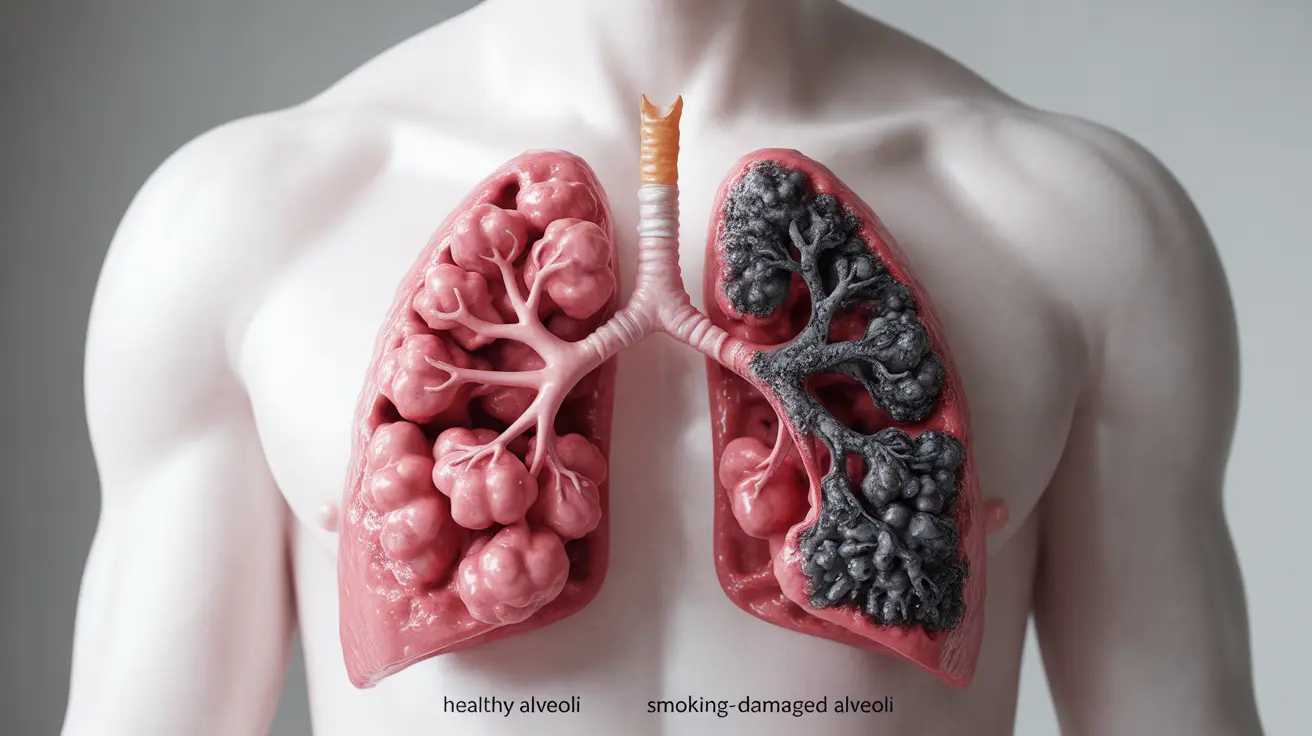Smoking and emphysema share a critical connection that affects millions of people worldwide. As one of the primary components of Chronic Obstructive Pulmonary Disease (COPD), emphysema progressively damages the lungs' air sacs, making breathing increasingly difficult. Understanding this relationship is crucial for both prevention and management of the condition.
While smoking isn't the only cause of emphysema, it remains the leading risk factor, responsible for about 80% of emphysema cases. This article explores the complex relationship between smoking and emphysema, including its development, symptoms, and available treatment options.
How Smoking Damages the Lungs
Cigarette smoke contains thousands of harmful chemicals that directly impact lung tissue. When inhaled, these toxins trigger several destructive processes:
- Inflammation of air sacs (alveoli)
- Destruction of elastic fibers in lung tissue
- Increased mucus production
- Impaired cleaning mechanisms in the airways
Over time, this constant exposure to toxic substances leads to permanent damage of the alveoli, causing them to lose their elasticity and eventually break down. This destruction creates larger, less efficient air spaces instead of many small, healthy ones, significantly reducing the lungs' ability to exchange oxygen and carbon dioxide.
Common Symptoms and Warning Signs
The symptoms of smoking-related emphysema typically develop gradually over many years. Early recognition of these signs is crucial for better management:
- Shortness of breath, especially during physical activity
- Chronic cough
- Wheezing
- Chest tightness
- Frequent respiratory infections
- Fatigue
- Unintended weight loss
As the condition progresses, these symptoms often become more severe and can significantly impact daily activities.
The Impact of Smoking Cessation
Quitting smoking is the single most important step in managing emphysema. While existing damage cannot be reversed, smoking cessation can:
- Slow disease progression
- Improve breathing capacity
- Reduce inflammation
- Lower the risk of complications
- Enhance the effectiveness of treatments
Research shows that smokers who quit experience better outcomes and slower decline in lung function compared to those who continue smoking.
Treatment and Management Strategies
Managing emphysema requires a comprehensive approach that may include:
Medical Treatments
- Bronchodilators
- Inhaled corticosteroids
- Antibiotics when necessary
- Oxygen therapy in advanced cases
Lifestyle Modifications
- Regular exercise within personal limits
- Pulmonary rehabilitation programs
- Proper nutrition
- Stress management
- Avoiding air pollutants and irritants
Prevention and Risk Reduction
While smoking is the primary risk factor for emphysema, other factors can contribute to its development:
- Secondhand smoke exposure
- Occupational dust and chemical fumes
- Air pollution
- Alpha-1 antitrypsin deficiency (genetic risk factor)
Taking steps to avoid these risk factors, particularly smoking, is crucial for prevention.
Frequently Asked Questions
How does smoking cause emphysema and damage the lungs?
Smoking introduces thousands of toxic chemicals into the lungs, causing inflammation and destruction of the air sacs (alveoli). This damage leads to the breakdown of lung tissue, reducing the lungs' ability to exchange oxygen and carbon dioxide effectively.
What are the common symptoms of emphysema in smokers?
Common symptoms include progressive shortness of breath, chronic cough, wheezing, chest tightness, frequent respiratory infections, fatigue, and unintended weight loss. These symptoms typically develop gradually over several years.
Can quitting smoking slow the progression of emphysema?
Yes, quitting smoking can significantly slow the progression of emphysema. While existing damage cannot be reversed, smoking cessation helps preserve remaining lung function and improves overall respiratory health.
Are there other risk factors besides smoking that can lead to emphysema?
Yes, other risk factors include exposure to secondhand smoke, occupational dust and chemicals, air pollution, and genetic factors like alpha-1 antitrypsin deficiency. However, smoking remains the leading cause.
What treatments and lifestyle changes can help manage emphysema caused by smoking?
Management includes medical treatments such as bronchodilators and corticosteroids, along with lifestyle changes including pulmonary rehabilitation, regular exercise, proper nutrition, and avoiding respiratory irritants. A comprehensive treatment plan should be developed with healthcare providers.




